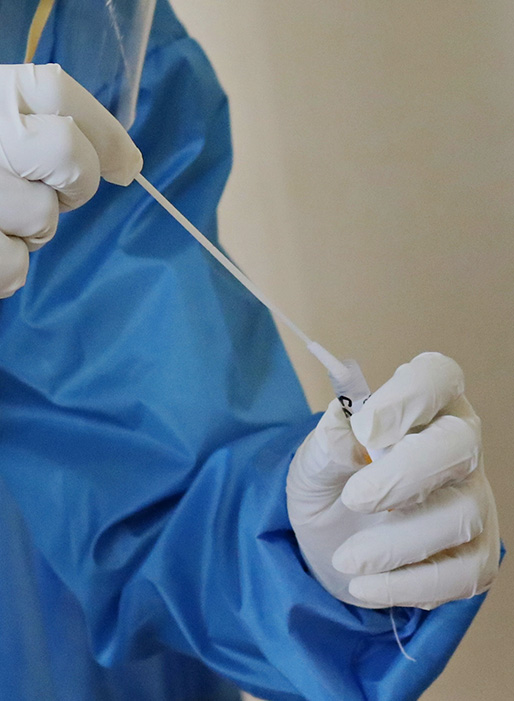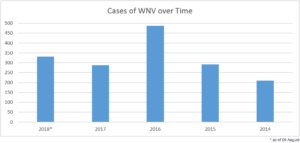
West Nile Virus Outbreak in Europe
14 Aug 2018
As of 09 August 2018, 331 cases of West Nile virus (WNV) have been reported in Europe this year. Italy has reported the greatest number of human cases with 123 followed by Serbia (102), Greece (59), Hungary (23), France (three), and Kosovo with two cases. There have also been 17 fatalities reported in Serbia (nine), Italy (three), Greece (three), Kosovo (one), and Romania (one). Most of the 2018 infections have occurred from late June. All of the aforementioned countries have reported cases of WNV in previous years and the current outbreak is not reported to be at epidemic levels. WNV is indigenous to Africa, Asia, Europe, and Australia. The peak of the transmission season in Europe is usually in the months of August and September.
Key Points
- Hundreds of cases of West Nile virus (WNV) have been reported in Europe this year, with an increase in summer months.
- At least 17 deaths have also been reported.
- Fatalities have occurred in Serbia, Italy, Greece, Kosovo, and Romania; cases have also been reported in Hungary and France.
Situational Summary
Health: As of 09 August 2018, 331 cases of West Nile virus (WNV) have been reported in Europe this year. Italy has reported the greatest number of human cases with 123 followed by Serbia (102), Greece (59), Hungary (23), France (three), and Kosovo with two cases. There have also been 17 fatalities reported in Serbia (nine), Italy (three), Greece (three), Kosovo (one), and Romania (one). Most of the 2018 infections have occurred from late June. All of the aforementioned countries have reported cases of WNV in previous years and the current outbreak is not reported to be at epidemic levels. WNV is indigenous to Africa, Asia, Europe, and Australia. The peak of the transmission season in Europe is usually in the months of August and September.
What is West Nile Virus?
WNV was first isolated in a woman in the West Nile district of Uganda in 1937, hence the name of the disease. West Nile virus is a viral disease hosted by birds but spreads to humans (and other mammals, notably horses) by mosquito bites. It has the potential to cause fatal neurological conditions in humans. WNV is a member of the flavivirus genus and belongs to the Japanese encephalitis antigenic complex of the family Flaviviridae. While WNV can be found worldwide, the largest outbreaks reported have occurred in Greece, Israel, Romania, Russia, and the US, and are generally on major bird migratory routes. It can only be spread from mosquito bites and there have been no cases of human-to-human transmission.
Symptoms
About 80 per cent of those who contract West Nile virus show no symptoms. For those who do develop symptoms of WNV, fever, headache, tiredness, body aches, nausea, vomiting, occasionally a skin rash (on the trunk of the body), and swollen lymph glands can be expected. The incubation period is usually between three and 14 days. In severe cases (also called neuroinvasive disease, such as West Nile encephalitis or meningitis or West Nile poliomyelitis), symptoms including headache, high fever, neck stiffness, stupor, disorientation, coma, tremors, convulsions, muscle weakness, and paralysis may also occur. Around one in 150 individuals who become infected with WNV will develop a more severe form of the disease. While the serious form of the disease can impact people of all ages, those over the age of 50, the young, or immunocompromised persons (and those with diabetes) are at the highest risk for getting severely ill when infected with WNV.
Treatment
While most people recover from WNV without any treatment, for more serious cases, treatment generally consists of supportive treatments aimed at limiting the symptoms of the disease rather than targeting the disease itself. While there are vaccines available for horses, there are not any currently available for humans.
Why the Increase in Cases?
Links have been made between the rise in cases of West Nile virus and climate change. Scientists have suggested that the earlier start to WNV transmission season could be related to warmer temperatures and higher levels of rainfall in Europe in 2018. These conditions encourage populations of Culex mosquitoes that carry the virus. Europe’s WNV season usually begins in July but this year the first case was reported in June in the Veneto region of Italy and in late May in Greece. There has also been a steep rise in early cases, with 168 cases reported in the first six weeks of the season compared with eight in 2014, two in 2015, 62 in 2016, and 66 in 2017. The large numbers of early cases within Europe suggest that this season’s outbreak will be larger than usual. The increase in cases serves as a reminder that as climate change impacts weather patterns in Europe, there will likely be an increase in mosquito-borne and mosquito-spread diseases such as West Nile virus.
Western Nile Virus in Europe Historically
Between May and November 2017, there were 288 cases of West Nile Virus reported in Europe (Austria, Bulgaria, Croatia, France, Greece, Hungary, Italy, Romania, Israel, Serbia, and Turkey). In 2016, 488 cases were reported during the same period (in Austria, Bulgaria, Croatia, Cyprus, Hungary, Italy, Romania, Spain, Israel, Russia, Serbia, Turkey, and Ukraine). 292 cases were reported in Europe in 2015 (Italy, Hungary, Romania, Bulgaria, France, Portugal, Israel, Russia, and Serbia). In 2014, 210 cases were reported across Austria, Greece, Hungary, Italy, Romania, Bosnia and Herzegovina, Israel, Russia, and Serbia.

SECURITY ADVICE
HealthModerateTravellers are always advised to contact their doctor at least six weeks before travelling and should undertake simple precautions to avoid being bitten for all locations where mosquitoes are prevalent. Measures include:
As noted, treatment for WNV does not involve a cure. Instead, treatment involves relieving symptoms, allowing the infection to run its course. If travellers believe they have contracted WNV, they should seek immediate medical advice. In general, those who contract the illness are advised to do the following
For most travel to Europe, Solace Global would not advise clients of the need to employ enhanced security measures. However, this may need to be reviewed depending on the exact location of travel and profile of the traveller. Travellers are also advised to use travel-tracking technology with an intelligence feed. This should enable a traveller to be alerted of any security updates within their vicinity and to update others of their movements in case of an emergency.